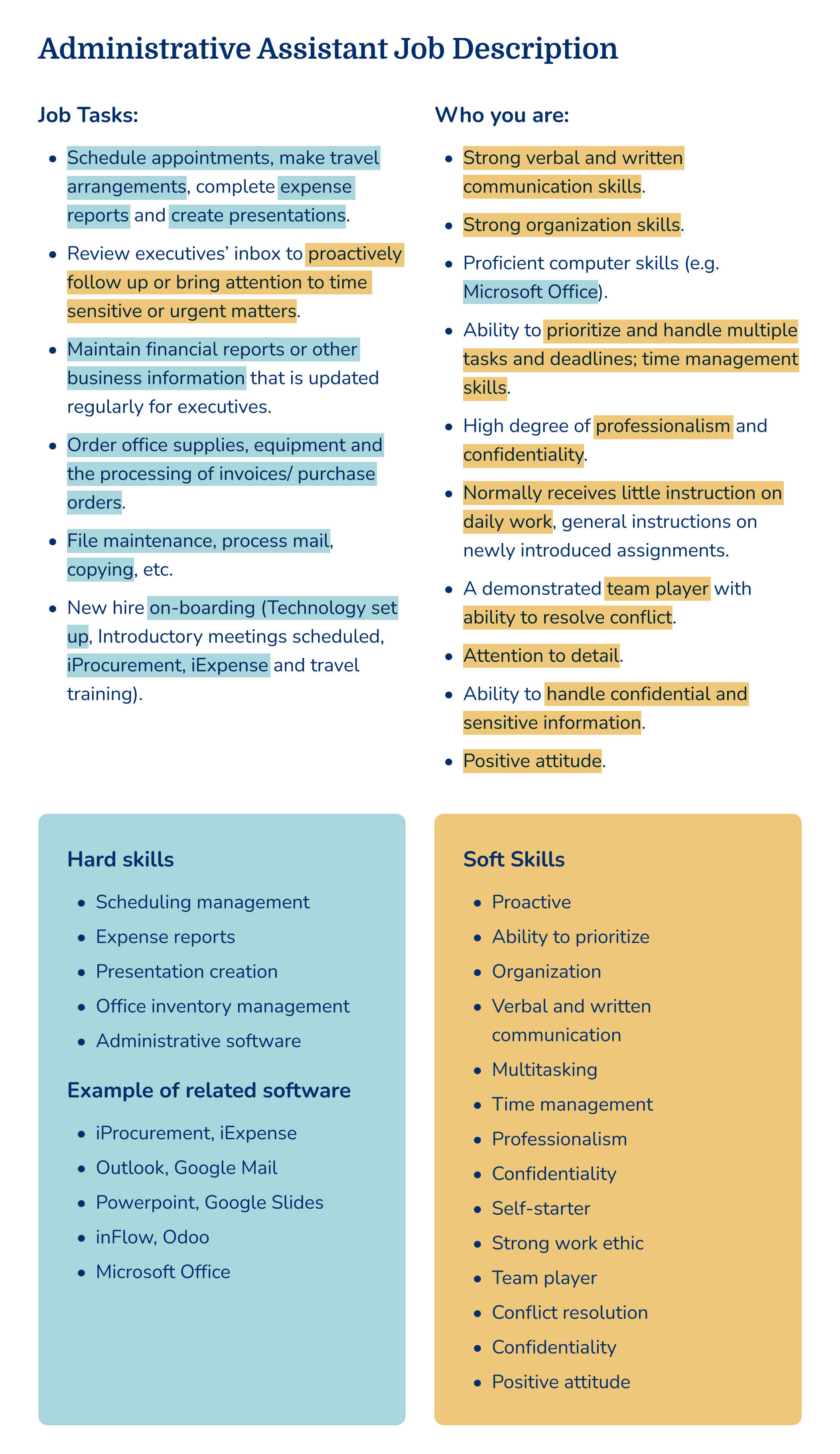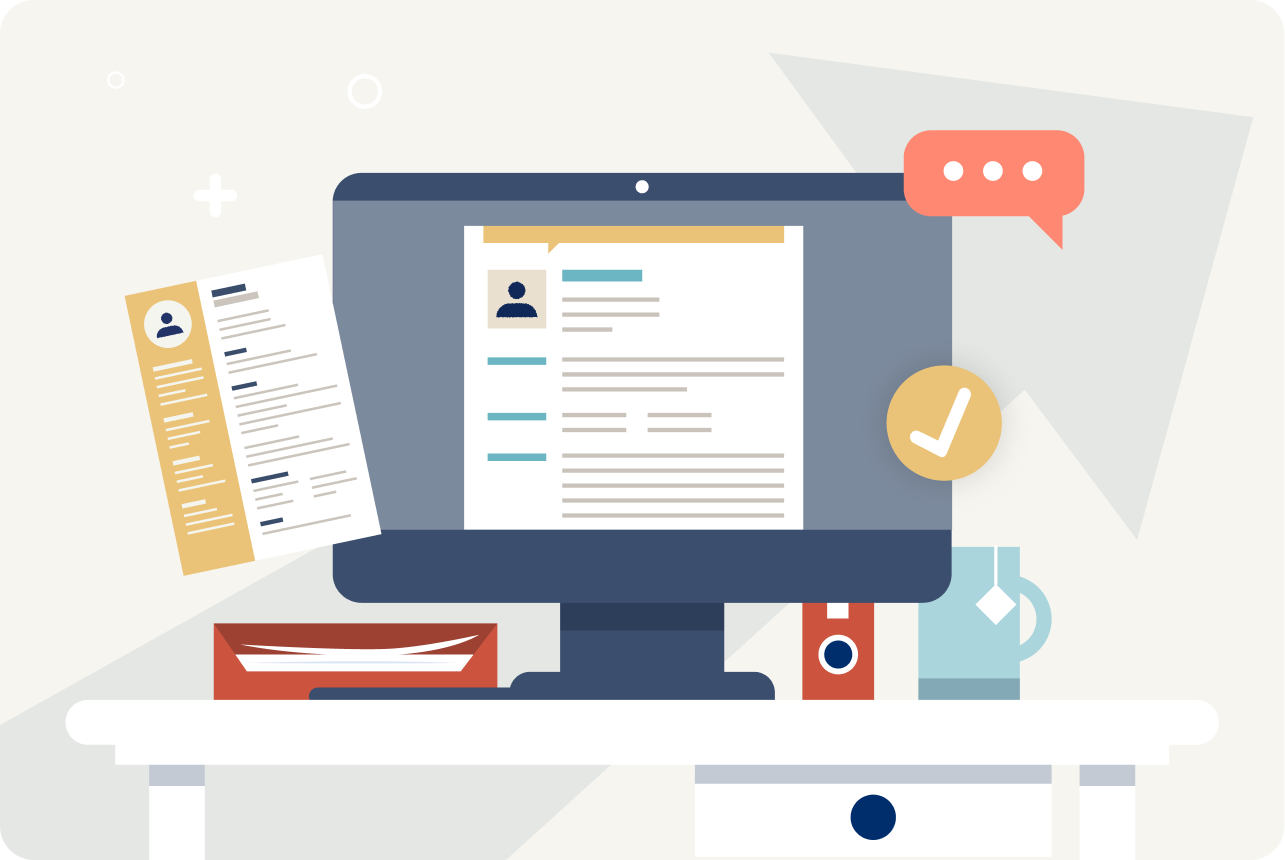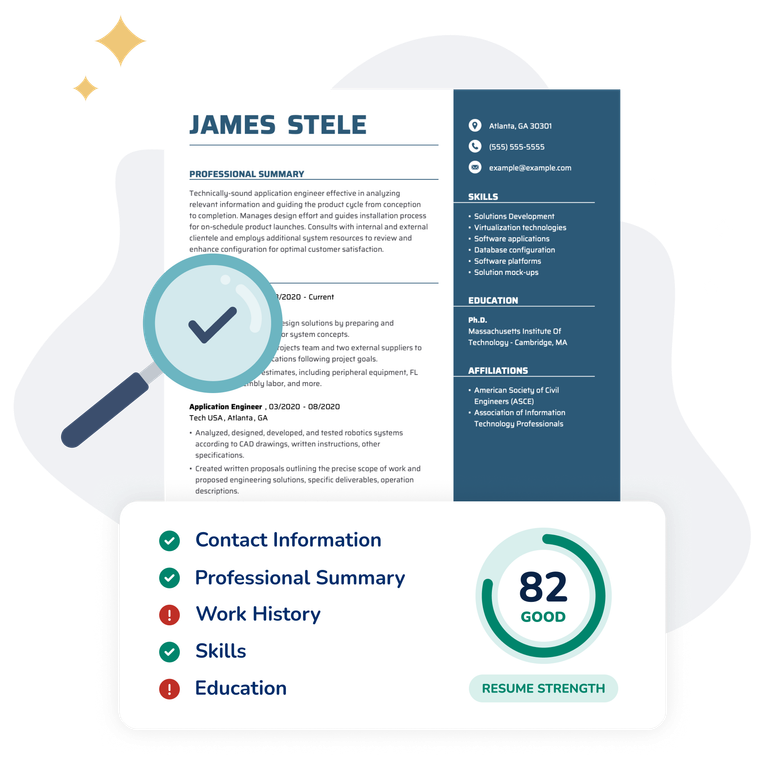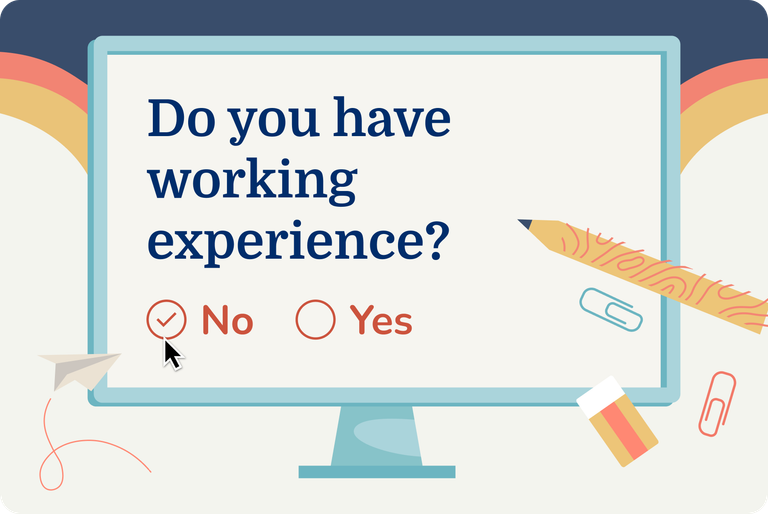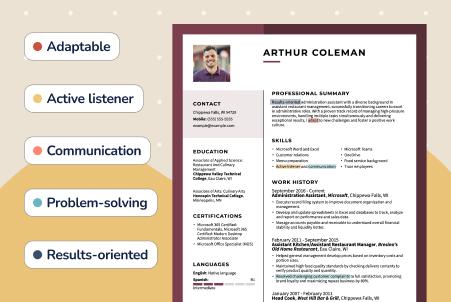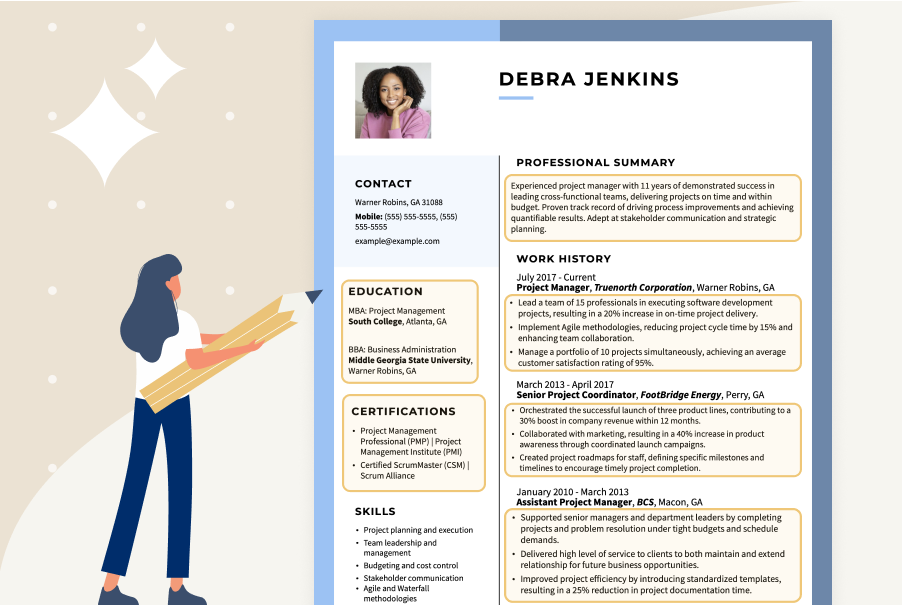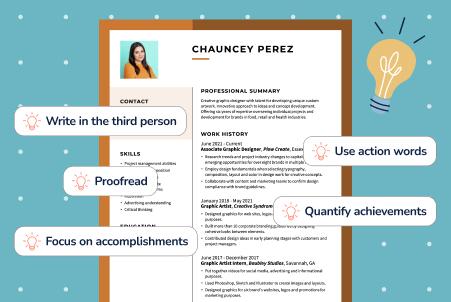150+ Skills for a Resume: Examples for Any Job

Our customers have been hired at: *Foot Note
Table of Contents
Get started with MyPerfectResume today!
- Build a resume on any device
- Pick an ATS-friendly template
- Tailor with AI copy suggestions
Crafting a standout resume starts with highlighting the skills and qualifications that demonstrate your fit for the role. But in a crowded job market, knowing which abilities will actually catch a recruiter’s eye can feel overwhelming. In this guide, we’ll break down the best skills for a resume in 2026.
Learn how to identify which skills are most in demand across industries, and how to showcase them strategically to stand out and secure more interviews.
What Is a Resume Skills Section?
A resume skills section is a dedicated area on your resume, typically placed after your professional summary or work history, that lists your relevant abilities and competencies.
Because recruiters and hiring managers often spend only a few seconds scanning each resume, a clear, well-organized skills section makes it easy for them to quickly see whether you have the qualifications needed to succeed in the role.
This section also plays a key role in applicant tracking systems (ATS). By reflecting the skills and keywords used in the job description, you improve your chances of passing automated screenings and having your resume reviewed by a human.
Tailor your resume skills section for every application, focusing on the specific skills mentioned in the job posting and prioritizing those that align most closely with the role.
Hard Skills vs Soft Skills
Resume skills generally fall into two categories: hard skills and soft skills. Understanding the difference between the two can help you create a stronger, more targeted resume.
Hard skills
Hard skills are the technical abilities you’ve gained through training, education, or hands-on experience. They’re specific to your role or industry and show employers you have what it takes to do the job, such as software, tools, or specialized methods. For example:
- Data analysis
- Programming language (e.g., Python or Java)
- Graphic design software (e.g., Adobe Photoshop or Illustrator)
- Project management tools (e.g., Asana or Trello)
- Foreign language proficiency (e.g., Spanish or Mandarin)
Soft skills
Soft skills are the personal qualities and interpersonal abilities that shape how you approach work and interact with others. They can be natural traits or skills you develop over time, and they play a key role in a functional and positive company culture. For example:
- Time management
- Critical thinking
- Conflict resolution
- Self-motivation
- Emotional intelligence
When writing your resume, list around 5 to 15 key skills, including a mix of hard and soft skills. This approach highlights a well-rounded skill set that shows both your ability to perform the role and work effectively.
Top 10 Skills to List on a Resume
Our research into resume skills revealed that the following are the most in-demand skills in resumes today, throughout all industries.
1. Interpersonal skills
Employers value candidates who can build strong working relationships. Interpersonal skills allow you to connect with others, collaborate effectively, and navigate team dynamics, which is essential in today’s workplace.
2. Adaptability
A rapidly changing job market requires candidates who can handle ever-shifting demands and continue to excel at their jobs. In your resume, add examples of how you’ve been able to go with the flow and adapt to what companies need.
3. Digital literacy and AI proficiency
Knowing how to use digital tools, safeguard your privacy, and navigate basic computer systems is essential. With AI transforming nearly every industry, showing how you’ve used it to improve workflow or spark innovation can set you apart.
4. Attention to detail
Catching mistakes and fixing them, ensuring all of your job duties are handled correctly, and delivering accurate, high-quality work are all hallmarks of great employees—all of which stem from great attention to detail, making it a good skill to put on a resume.
5. Time and workflow management
Employers seek candidates who can accomplish tasks efficiently and reliably. Strong time management skills show that you’re committed to your responsibilities, can meet deadlines, and handle multiple tasks without losing focus.
6. Strong work ethic
How you approach your work is as important as the technical skills you add to your skills section. Employers will always appreciate a work ethic that shows you’re dedicated and committed to the job.
7. Customer-centric thinking
Great customer service skills mean putting client and user needs first—whether you’re solving a problem, delivering a product, or shaping a service experience. On your resume, highlight how you’ve listened to feedback, built trust, or helped improve customer satisfaction.
8. Innovation and creativity
Companies value employees who can think creatively. Whether you’ve improved a process, introduced a new process, or contributed to a creative project, show it on your resume. Highlight moments where your ideas made a difference or helped your team solve a tough challenge.
9. Project and operations management
Advancing your career relies heavily on showing you can oversee and manage work projects. Be sure to mention project management skills and any familiarity with Agile methodologies, such as Scrum, or project management software, such as Trello and Zoho.
10. Cross-functional collaboration
Work today rarely happens in a silo. Employers look for candidates who can collaborate across teams, departments, and roles. On your resume, show how you’ve worked with people from different backgrounds or functions to solve problems, launch projects, or meet shared goals.
The best skills to add to a resume will depend on both your experience and the employer’s requirements. See if any of the above skills apply to you and set them aside to get started.
10 Best Hard Skills for a Resume
Including the right hard skills on your resume can help you stand out and show employers you’re qualified for the role. Below are some of the most valuable hard skills to feature on your resume.
1. Data analysis
The world runs on data and the ability to analyze it, draw intelligent conclusions, and use your findings to improve business operations. Essential related resume skills include:
- Data visualization
- Programming
- Skills statistics
- Knowledge programming tools
- MATLAB

2. Cybersecurity
Nothing is worse for a business than stolen data, and cybersecurity professionals are the first vital line of defense against hackers. In addition to cybersecurity certifications, other highly sought-after computer skills for resumes include:
- Knowledge of security across different platforms
- Computer forensics skills
- Risk identification and management
- Scripting
- DevOps

Related jobs:
3. Programming
Programming skills are valuable for working with websites, internal networks, and mobile apps. Feature your knowledge of specific programming languages and other related skills in your resume skills section, such as:
- Java
- HTML5
- Cloud computing
- Web development
- Object-oriented programming (OOP)

Related jobs:
4. Marketing
Marketing helps businesses reach out to consumers and increase sales, subscriptions, and overall engagement. Related resume skills examples include:
- Search engine optimization (SEO)
- Search engine marketing (SEM)
- Email and social media marketing
- Copywriting
- Google Analytics

5. Accounting
Handling financial matters is an essential part of any business, and the ability to parse numbers, analyze budgets, and provide detailed, accurate account management is a crucial component of finance. Skills to add to a resume in this field include:
- Microsoft Excel
- Big data analysis
- QuickBooks
- Tally
- Financial statements

Related jobs:
6. Design
Companies have a high need for polished design work, from multimedia to website layouts. Important skills to put on a resume for this type of job include:
- Adobe Creative Suite
- UI design
- UX wireframing
- Typography and layout design
- HTML/CSS

Related jobs:
7. Writing
Even in today’s tech-heavy world, good writing skills are still necessary for communication, executing marketing campaigns, assembling documentation, and creating presentations. Good skills to put on a resume for this ability include:
- Content writing
- Editing
- Business report and proposal writing
- Creative storytelling
- Planning and outlining

Related jobs:
8. Cloud computing
Jobs in cloud computing will only increase as more companies move important data to the cloud or use it to manage employee tasks. Related skills to add to a resume for this career include:
- Cloud architecture
- Networking
- Cloud middleware technologies
- Data management
- Application programmer interfaces (APIs)

Related jobs:
9. Specialized machinery
Whether licensed to drive large transport vehicles or operate heavy equipment, having training or certification in machinery operation is something you can add to the skills section of a resume to open doors to jobs in many industries, from inventory to construction. These include:
- Forklift operation
- Backhoe
- Certified Equipment Manager (CEM)
- Loaders operation
- Physical stamina and strength

10. Foreign languages
As the global economy becomes more integrated, employers increasingly need multilingual employees. People who speak more than one language also often have better memory and multitasking ability. Make sure to highlight your multilingual abilities in your resume skills section, such as:
- Spanish
- Italian
- Japanese
- German
- French

Related jobs:
Check out our full library of professional resume examples to see how other job seekers across industries showcase their skill set.
10 Best Soft Skills for a Resume
Soft skills are highly valuable to employers and can improve job performance while increasing your career advancement opportunities. Explore the top soft skills for resumes below.
1. Communication
Employers expect strong communication skills for most jobs. In your resume, include achievements that involve interacting well with others, and stress “verbal and written communication” in your resume skills section.

2. Teamwork
Even if you’re working remotely, collaborating with and supporting other team members remains an essential soft skill for your resume. Provide examples of how you’ve successfully worked alongside others and contributed to the successful operations of your team.

3. Problem-solving
Using creative thinking, experience, and resourcefulness to overcome obstacles is an essential workplace skill. Showcase problem-solving skills in your resume’s work history section by sharing accomplishments in which you had to work through a challenge.

4. Empathy
Understanding others' feelings helps build strong workplace relationships. Empathy improves communication, teamwork, and customer service by fostering respect and collaboration.

5. Leadership
One of the surest ways to advance in your career is to demonstrate strong leadership skills. Professionals with a talent for leading others toward success, whether by taking charge of a project, mentoring junior employees, or providing positive direction for a team or company, are highly valuable across industries.

6. Dependability
Employers need team members they can count on to consistently deliver quality work and meet deadlines. Demonstrating dependability shows you’re responsible and trustworthy—qualities that make you a valuable asset.

7. Active listening
Staying focused when interacting with others and receiving instructions helps you communicate more effectively, build stronger relationships with colleagues and clients, and identify problems and solutions more efficiently. Highlighting this skill on your resume shows that you’re attentive and dependable.

8. Critical thinking
Employers value employees with critical thinking skills who can think independently and adapt to changing situations. Demonstrate this skill by sharing examples of times you used good judgment to complete a project, improve a process, or achieve a successful outcome.

9. Conflict management
When conflict arises with coworkers, managers, other departments, or clients, staying calm, objective, and focused on solutions is a valuable asset. Conflict management skills to highlight on your resume include facilitation, mediation, and active listening, all of which demonstrate your ability to navigate difficult situations.

10. Organization
Keeping tasks on track is an essential skill, especially for roles that involve managing large amounts of data, paperwork, events, or teams. Highlight organizational skills on your resume by showcasing experiences where your planning and coordination made a measurable difference.

Essential Resume Skills by Industry
Understanding which skills matter most in your field helps you tailor your resume to what hiring managers are actually looking for. Below, you’ll find key resume skills organized by industry to help you highlight the right strengths and stand out in a competitive job market.
Top 8 accounting skills
- Attention to detail
- Organization
- Time management skills
- Critical thinking
- CRM systems
- Knowledge of tax regulations
- Proficiency with specific software (e.g., Intuit QuickBooks Online, FreshBooks)
- Financial reporting and budgeting
Top 8 business operations skills
- Communication
- Motivational skills
- Organizational abilities
- Problem-solving
- Project management
- Negotiation skills
- Compliance and oversight
- Financial analysis and reporting
Top 8 computer software skills
- AWS
- Project management
- Knowledge of programming languages (e.g., Java, Python)
- Software testing and debugging
- Problem-solving
- Written and verbal communication
- Attention to detail
- Adaptability
Top 8 customer service skills
- Communication
- Flexibility
- Positivity
- Active listening skills
- Product/service knowledge
- Point-of-sale (POS) systems
- Customer management
- Digital awareness
Top 8 data administration skills
- Attention to detail
- Problem-solving
- Communication
- Collaboration
- Data collection and management
- Knowledge of database applications (e.g., DB2)
- Troubleshooting
- Database administration certification (e.g., Oracle MySQL)
Top 8 finance skills
- Analytical ability
- Communication
- Attention to detail
- Problem-solving
- Financial reporting
- Data collection and management
- Proficiency in accounting software (e.g., QuickBooks)
- Project management
Top 8 fitness and nutrition skills
- Motivation
- Patience
- Communication skills
- Empathy
- Personal training techniques
- Knowledge of physiology
- Knowledge/certification in dietetics
- Assessing nutritional needs
Top 8 food service skills
- Multitasking
- Teamwork
- Communication
- Flexibility
- Customer service
- Menu memorization
- Knowledge of food safety standards/procedures
- Inventory management
Top 8 healthcare support skills
- Excellent communication
- Attention to detail
- Empathy
- Adaptability
- Analyzing medical information and data
- Certification in first aid/CPR
- Specialized medical knowledge (e.g., occupational therapy)
- Knowledge of regulatory practices
Top 8 hospitality skills
- Communication
- Multitasking
- Conflict resolution
- Teamwork
- Customer service
- Human resource management
- Maintenance and cleaning
- Marketing skills
Top 8 human resources skills
- Teamwork
- Communication
- Multitasking
- Time management
- Performance management
- Legal knowledge
- Project management
- Knowledge of HR-related software (e.g., BambooHR, OpenHR)
Top 8 information technology skills
- Organizational skills
- Problem-solving
- Attention to detail
- Critical thinking
- Coding skills
- Computer networking
- Project management
- Troubleshooting
Top 8 inventory management skills
- Verbal and written communication
- Organizational skills
- Problem-solving
- Teamwork
- Inventory control
- Warehouse operations
- Supply chain management
- Knowledge of inventory software (e.g., NetSuite)
Top 8 marketing skills
- Organizational skills
- Excellent time management
- Verbal and written communication
- Collaboration
- Copywriting
- Social media
- Project and campaign management
- Data analysis
Top 8 medical skills
- Problem-solving
- Empathy
- Flexibility
- Interpersonal skills
- Patient preparation
- Taking vital signs
- Administration
- Expertise in specific medical fields (e.g., phlebotomy)
Top 8 nursing skills
- Empathy
- Time management
- Communication
- Strong work ethic
- Basic life support
- Patient records maintenance
- Critical care nursing
- EHR proficiency
Top 8 production skills
- Dependability
- Strong work ethic
- Teamwork
- Attention to detail
- Quality management
- Computer-automated technologies
- Knowledge of continuous improvement processes
- Internal purchasing
Top 8 sales skills
- Communication
- Active listening
- Problem-solving
- Time management
- Product knowledge
- Negotiation
- Prospecting
- Buyer research
Top 8 teaching skills
- Patience
- Communication skills
- Conflict resolution
- Enthusiasm
- Subject-matter expertise (e.g., social studies, science)
- Mentorship
- Creativity
- Lesson planning
Top 8 web development skills
- Verbal and written communication
- Analytical abilities
- Problem-solving
- Detail-oriented
- Coding and programming skills (e.g., HTML/CSS, Java, Python)
- Knowledge of web platforms and browsers
- Testing and debugging
- Back-end or front-end knowledge
How to List Skills on a Resume
Explore how to showcase your skills throughout your resume. Whether you include them in a dedicated skills section, weave them into your work experience, or feature them in your summary, the way you present your abilities can help recruiters quickly see your value.
Review the job posting to identify key skills
Review the job description carefully to determine what abilities the employer is looking for, and note which key skills to add to your resume accordingly.
Depending on the job and industry, required skills may include personal qualities such as teamwork, problem-solving, and communication, or hard skills like Photoshop or AutoCAD.
You can also visit the company’s website to learn more about its mission and goals, which can highlight the qualities its culture embodies and the goals it’s working toward.
Here's an example of how to analyze the job description to identify key skills:
Match your skill set to the job requirements
Once you’ve pinpointed your skills that match the company's needs, create a master list of the most critical hard and soft skills for your resume.
Not every skill you possess needs to be—or should be—listed in your resume skills section. Instead, create a targeted resume by including only those directly impacting the job you’re applying for and the ones that will help you prove to be the best candidate for the role.
If you’re making a career change, focus on transferable skills, which are qualities and abilities that can be transferred from one job to another, even in different industries.
Need help creating your skills section? Our AI Resume Skills Generator instantly builds a skills list tailored to your job title:
AI Resume Skills Generator

Create a dedicated skills section
A dedicated skills section gives recruiters a scannable snapshot of your most relevant abilities. The position and layout of your skills section will depend on the resume format you use.
There are three main resume formats you can choose from, depending on your experience level and career goals: chronological, functional, and combination.
See how to create a skills section for each of these resume formats below.
Chronological resume skills section
If you have extensive experience in the career or field you’re interested in, use a chronological resume format. In this format, your work history is followed by a list of six to eight key skills.
Focus on your top soft and hard skills, and provide examples of how you’ve applied your skills in past jobs under your work history entries. For example:
SKILLS
- Medical administration
- Knowledge of HMOs and Medicare
- Electronic Medical Record (EMR) software
- Insurance and billing processes
- Patient services
- Verbal and written communication
- Multitasking
Functional resume skills section
If you have limited work experience but possess relevant skills and training, a functional resume format can help you shine. This example of a functional resume skills section shows how categorizing your abilities provides a clear, detailed snapshot of your strongest qualifications:
PROFESSIONAL SKILLS
Administration
- Scheduled 10+ visitors daily and greeted them upon arrival at the reception.
- Validated insurance credentials and ensured claims complied with the office’s policies.
- Reordered stock in short supply with enough time to restock the item before it ran out entirely.
Interpersonal
- Interacted with 10+ vendors, professional services personnel, and contractors to receive orders and communicate instructions.
- Collaborated and organized weekly staff meetings with teams of 20+ personnel.
- Organized conference rooms with appropriate materials and distributed notes for personnel.
Technical
- Composed internal memos and external correspondence for four senior executives using MS Office.
- Coordinated bookkeeping activities in QuickBooks and AdvancedMD medical billing software.
- Managed multiline telephone and directed internal and external phone calls to senior executives.
Combination resume skills section
Use a combination resume format if you have a few years of experience in your field or are switching careers and want to display your most relevant skills alongside your experience.
This resume format provides a balanced presentation of your skills and work experience, allowing you to present your qualifications in detail.
Here’s an example of how to feature skills on a combination resume:
SUMMARY OF QUALIFICATIONS
- Well-versed in records management and maintenance.
- Researches and resolves claims on time.
- Specializes in quality assurance and auditing.
RELEVANT SKILLS
- Financial reporting
- Payment processing
- ERP software
- Completing insurance forms
- Explanation of Benefits (EOB)
- Account reviews and assessment
Feature job-relevant skills in your resume summary
Your resume summary statement is the first thing recruiters will read, so start strong by mentioning your top qualifications and skills. What’s the one trait or area of expertise you want employers to know most about? Mention it right off the bat in your summary. For example:
Organized and compassionate patient service representative with over 10 years of experience in fast-paced healthcare environments. Skilled in patient advocacy, education, and front office coordination, with a proven ability to manage high patient volumes while maintaining accuracy, empathy, and professionalism. Adept at streamlining administrative workflows, supporting cross-functional medical teams, and ensuring a positive patient experience from check-in to discharge.
Show how you’ve used your skills in your work history section
Incorporate examples of how you’ve applied your abilities in your work experience section to show real-world impact. Highlight achievements, projects, or results that reflect your expertise and give recruiters concrete evidence of what you can do. For example:
Project Manager | BrightTech Solutions – New York, NY
January 2021 – December 2025
- Led a team of 12 to successfully deliver 10+ software development projects on time and under budget, improving client satisfaction by 20%.
- Developed and implemented project plans, timelines, and budgets, demonstrating strong organizational and planning skills.
- Streamlined reporting processes using project management software (Asana, Jira), enhancing team productivity and efficiency by 15%.
This work history entry includes measurable accomplishments that highlight key skills like project management, leadership, communication, problem-solving, and software proficiency.
Expand on skills from your resume in your cover letter
Your cover letter is the perfect place to give context to the skills listed on your resume. Instead of just repeating them, show how you’ve applied these abilities to achieve real results.
Highlight specific examples, such as projects you led, challenges you overcame, or improvements you implemented, to demonstrate your expertise and give hiring managers a clear picture of the value you can bring to their team. When writing your cover letter, structure each paragraph to highlight job-relevant skills. Here's how:
Include your most relevant skills in the introduction
With over a decade of experience in fast-paced healthcare settings, my strongest asset is my ability to provide organized, compassionate, and efficient patient service. I pride myself on creating a seamless front-office experience while ensuring patients feel heard, respected, and well-informed throughout their care journey.
Provide specific examples in the body paragraphs
In my previous role as a patient service representative, I coordinated a high-volume front desk, managing up to 100 daily patient interactions while maintaining accuracy in scheduling, insurance verification, and medical record handling. I also collaborated closely with clinical teams to resolve urgent patient concerns, resulting in a 20% improvement in patient satisfaction scores over 12 months. My attention to detail and calm presence under pressure earned recognition from both supervisors and patients alike.
Beyond administrative coordination, I’ve championed patient advocacy and education efforts, creating a set of patient-friendly intake forms and FAQs that reduced check-in times and increased clarity around treatment plans. Whether helping a nervous patient navigate a new diagnosis or working behind the scenes to streamline workflows, I bring a service mindset and deep commitment to healthcare excellence.
Reiterate skills in the closing paragraph
Reviewing professional cover letter examples can help you get ideas on how to communicate your strengths and your alignment with the company's values and goals.
Key Takeaways
- Include a balanced mix of hard skills and soft skills to demonstrate both your technical abilities and workplace strengths.
- Highlight skills that showcase your value as a candidate and your ability to perform the job effectively by prioritizing skills mentioned in the job description.
- Choose a resume format that emphasizes your strengths: functional for entry-level candidates, chronological for extensive experience, and combination for career changers.
- Use your professional summary to showcase your most important job-relevant skills.
- In your work history section, demonstrate how you applied skills to achieve measurable results.
- Expand on your skills in your cover letter through storytelling, illustrating accomplishments that combine both hard and soft skills.
FAQ
How many skills should you list on a resume?
The ideal number of skills to list on a resume is generally 5 to 15, depending on your experience and the position you’re applying for.
Listing too few skills can make your resume appear sparse, while listing too many can overwhelm the reader and dilute your strongest abilities.
Aim for a balanced mix of hard skills—technical, job-specific abilities—and soft skills such as communication and leadership, focusing on those most relevant to the role.
Tailor your skills to each job by emphasizing the ones mentioned in the job description and those that best demonstrate your qualifications. This approach not only helps your resume stand out to recruiters but also improves its performance in ATS.
What are transferable skills?
Transferable skills are skills and abilities that you acquire in one job or situation that can be applied to another job or situation. These skills are considered valuable to employers because they can be used across different industries or job functions.
Some examples of transferable skills include:
- Communication
- Teamwork
- Problem-solving
- Critical thinking
- Time management
- Leadership
- Adaptability
- Customer service
Having a strong set of transferable skills can make it easier to transition between jobs and industries. They can also make you a more attractive job candidate, as employers value employees who can bring diverse skills and experiences to their organization.
How can I show that I have transferable skills?
To showcase your transferable skills on your resume, ensure every section is optimized to highlight the skills you already have to offer. Here are a few tips:
- Choose a functional resume format. It focuses on your skills and downplays any lack of experience.
- Include your strongest job-relevant skills in your professional summary.
- Highlight your soft skills in the skills section of your resume and include hard skills you can still use in this new position, for example, Microsoft Office or data analysis.
- Feature job-relevant achievements in your work experience section and include numbers to highlight your strengths as a candidate.
- Build a cover letter to launch your new career by expanding on your skills, willingness to learn, and how skills from a different job experience can help you excel at this role.
See our guide on skills-based hiring to learn how to showcase relevant skills on your resume and throughout the hiring process.
How do I make my resume skills section stand out?
To help your resume skills section stand out, read the job description carefully and research the company to highlight the skills and abilities that the employer is seeking. Here are a few tips:
- Choose the right resume format based on your years of experience, and match the job description to your skills and experience.
- Select a resume template to showcase professionalism. When in doubt, keep it simple and let the content speak for itself.
- Use a cover letter to expand on your interest in the role, your expertise and experience, and, most importantly, to connect with the hiring manager.
Check out our guide on what to put on a resume for additional tips and tricks from career advice experts. We also recommend exploring how to showcase upskilling on your resume to stand out.
How do I find good skills to have on a resume for my industry?
To identify the most in-demand skills for your industry, you can conduct research on job postings, talk to industry experts, attend conferences and events, and analyze industry trends and developments.
You can also consult with recruiters and staffing agencies that specialize in your industry to gain insights into the skills that are most sought after by employers.
What is the best way to showcase my skills during an interview?
To showcase your skills during a job interview, consider the following strategies:
- Prepare examples of specific instances where you demonstrated your skills effectively.
- Align skills with the job description and identify the key skills required.
- Use the STAR method in your answers.
- Be specific by providing details about your work, projects, and impact.
- Quantify your achievements to showcase the impact of your skills.
- Demonstrate adaptability by applying your skills to different scenarios.
- Ask insightful questions toward the end of the interview.
Remember to be confident, enthusiastic, and authentic in your responses. By effectively showcasing your skills, you can leave a lasting impression on the interviewer.
How we reviewed this article
Since 2012, we have helped more than 11 million job seekers. We want to make your career journey accessible and manageable through our services and Career Center’s how-to guides and tips. In our commitment to bring you a transparent process, we present our Editorial Process.
Our customers have been hired at:*Foot Note



